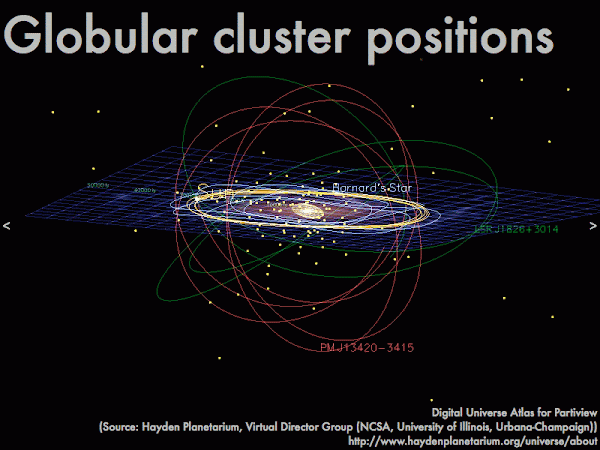Cuesta College, San Luis Obispo, CA
Students have a weekly online reading assignment (hosted by SurveyMonkey.com), where they answer questions based on reading their textbook, material covered in previous lectures, opinion questions, and/or asking (anonymous) questions or making (anonymous) comments. Full credit is given for completing the online reading assignment before next week's lecture, regardless if whether their answers are correct/incorrect. Selected results/questions/comments are addressed by the instructor at the start of the following lecture.
The following questions were asked on reading textbook chapters and previewing presentations on the Milky Way's shape, size and composition and spiral arm structure and formation.

Selected/edited responses are given below.
Describe something you found interesting from the assigned textbook reading or presentation preview, and explain why this was personally interesting for you.
"That in very dark skies if you take a look at the Milky Way, which to the ancient Greeks resembled a milky stream across the sky."
"I thought the Milky Way night photo was super cool and interesting because it encompasses science and the outdoors in such a beautiful way. I love to be outdoors and in nature so this really resonated with me."
"I like how it was once again proven that we are not the center of the universe as I feel when we think this way without waiting for proof we are very narrow-minded."
"That the Milky Way sort of has arms. Making it look like a spiral."
"The mystery of dark matter is always interesting to hear about. What is dark matter? How can we find it, and once we find it how can we identify it? These are questions I sincerely hope are answered in my lifetime."
"Learning a bit about dark matter in the Milky Way galaxy was interesting. I had no idea that dark matter is what creates and spreads out the gravity in the galaxy. This unusual matter that does not deal with light or stars or gas or dust is holding our galaxy together."
"Dark matter--thinking about the majority of matter that is not seen and doesn't interact with our realm of reality is fascinating."
"Persistence of vision, along with the different examples provided."
"Something interesting was learning about stars' formation. As gas and dust compress, star formation occurs and lights up a spiral arm."
"I liked the traffic jam analogy. It's interesting to think that stars form that way. And that sometimes they do form, and sometimes they don't."
"The PimpStar Rims comparison was a very funny and clever way to compare the formation of the spiral arms in a galaxy. I was able to understand it better."
"I like that the explanation for the broken spiral arms I saw in the GalaxyZoo lab is finally revealed."
Describe something you found confusing from the assigned textbook reading or presentation preview, and explain why this was personally confusing for you.
"I found confusing as to how we can determine the shape of the Milky Way along with where the center is?"
"The fog model."
"The difference between the centered and spread-out mass in a galaxy."
"Dark matter."
"I don't fully understand how persistence of vision is associated with the Milky Way."
"I am confused with dwarf galaxy interactions and the triggering of density waves. I can get that when a smaller galaxy comes close to a bigger one it gets sucked in but I do not understand what it has to do with triggering density waves."
"The entire concept of density waves has gone completely over my head. I dearly hope you'll explain in easier-to-understand terms in class at some point."
"I don't really feel confused on anything."
In your experience, how much of the "Milky Way" (the band of faint stars across the celestial sphere) have you been able to see in the night sky?
As much as can be seen with the naked eye. ****** [6] Not very much. ***** [5] Barely seen it. ***** [5] (Never been able to see it.) ****** [6] (Unsure/guessing/lost/help!) [0]
Using the most powerful light-gathering optical telescopes in the darkest skies, __________ of the stars in our entire galaxy can be observed from Earth.
1%. ************ [12] 5%. ** [2] 10%. **** [4] 50%. [0] 100%. * [1] (Unsure/guessing/lost/help!) *** [3]
 If you did not have access to a mirror while camping, what could you do to find out whether or not you're having a bad hair day?
If you did not have access to a mirror while camping, what could you do to find out whether or not you're having a bad hair day?"Ask the most honest person around you."
"Use a still pool of water as a mirror."
"Use your phone's camera."
"Just throw my hair in a messy bun that way it looks crazy on purpose."
"If you're really camping, every day is a bad hair day. You will feel the hair sticking out everywhere."
"I always have a bad hair day."
"Look for wild animals, see if they run."
"You can use your hands and feel your hair to find out if your having a bad hair day or not."
"Through your own shadow."
Look at PimpStar Rims (*.html) for cars, or MonkeyLectric Rims (*.html) for bikes. Briefly explain how they work.
"They work because of a series of blinking LED being placed under a rapid speed will emit a certain pattern."
"They blink and leave an afterimage which is similar to a strobe effect."
"It's a set of LED lights that are in the wheels that have a built in microprocessor and adapter. and as they spin it creates the magic."
"I am fairly certain they harness their sheer tastelessness to emit a glow of pure obnoxious energy."
Ask the instructor an anonymous question, or make a comment. Selected questions/comments may be discussed in class.
"Nearly ten years ago, I went camping with the boy scouts on Catalina Island. When the lights in the camp facilities went off, there was absolutely no light pollution for miles around, so I could see the entire night sky, including the milky way, totally unobstructed for the first time ever. I've always wanted to see the sky that way again, but I haven't been able to find a night sky so clear since then."
"The comic book style notes help."
"Do you imagine the PimpStar Rims or the MonkeyLectric Rims will become popular?" (I have them on my bike.)
"One thing I found confusing is disk stars and halo stars. Which one does our galaxy consists of?" (Both, although the halo star clusters above and below the disk are pretty sparse.)
"I have never gotten a good view of the Milky Way. Where and when in California is the best to view the Milky Way?" (Make sure the moon is not up. Then go somewhere dark and clear--I would suggest Carrizo Plain, but some other less remote, nearby locations might work.)
"What separates galaxies? Void? Void from lack of gravity? Is it safe to assume that space is infinite?" (The space between galaxies really is empty (no gas/dust, so no stars will ever be made in that space). Right now it seems that the universe is infinite, or at the least so large that it might as well be infinite, but that's not a completely settled question.)
"When is our second midterm?" (In two weeks.)
No comments:
Post a Comment